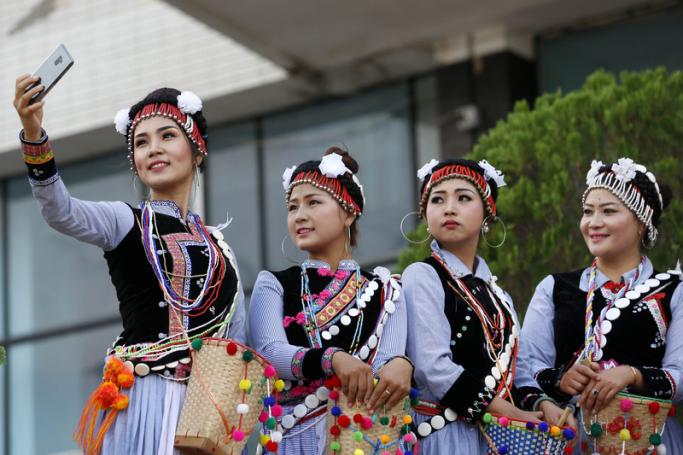Myanmar is rich in religious diversity but often appears poor when it comes to religious discrimination.
Just ask May Phu, the nickname of an ethnic Lisu woman, born and raised in Mogok in Mandalay Division. She understands what it is like to be both a hilltribe person and a Christian in majority Buddhist Myanmar.
“Christianity is also a big religion in Myanmar. Many non-Christian people usually celebrate Christmas Day and have fun on it. However, some discriminate against the Christians. There would be no Christmas without Christians,” May Phu told Mizzima.
Myanmar is the home of dozens of ethnic and hilltribe groups, in addition to the majority Bamar.
May Phu’s Lisu people are a Tibeto-Burman ethnic group who typically inhabit the mountainous regions of Myanmar, as well as southwest China, Thailand, and the Arunachal Pradesh state of India. In Myanmar, Lisu live in the north of the country: Kachin State (Putao, Myitkyina, Danai, Waingmaw, Bhamo), Shan State (Momeik, Namhsan, Lashio, Hopang, and Kokang, Namsang, Loilem, Mongton), Sagaing Region (Katha and Khamti), and Mandalay Region (Mogok and Pyin Oo Lwin).
The majority of Lisu are Christians. Some Lisu worship traditional deities and Buddhism.
MayPhu says she was discriminated against for being Christian. She suffered from religious discrimination not only in her hometown Mogok but also while working in other cities in Myanmar. She always felt humiliated for being a Christian when she was young. In the classroom, she was singled out and treated poorly. She said that she was verbally harassed and abused sometimes. She added that only those who has suffered discrimination will understand her situation.
“During my school time, we used to talk with friends when we had free time. When talking about religion, we ended up fighting as there was only me as a Christian and they ganged up together. Since then, I have not talked with those friends. One of my friends even changed her sitting place. I was being discriminated against that much.
“Some friends used to talk with me. When they came to ask me about religion, I refused to discuss that topic. When I was forced to talk about it, they would pick up the differences with them and would not call me anymore. I got into a fight with them as they came to ask me by themselves and disrespected my religion. They did not research in-depth but refused to accept what I said.”
It was not just school that presented a problem. May Phu found difficulty in the workplace when working in a number of cities and was not afforded the same rights as the majority Buddhists.
Rest days proved a subject of contention.
“More than religiously discriminated against, they used to close the shops and rest on the Buddhist religious days. However, they did not want to give Sunday as a rest day [an off-day] for a Christian. While some employers used to give four rest days per month, I wanted them to give Sunday. Instead, they gave me other days. I want to rest on Sunday as we all receive four rest days.
“Even when taking turns for rest days, they would likely choose staff members of other religions to rest on Sunday rather than Christians. What would be the advantage for them? If it is taking turns, I would like them to understand to allow me Sunday as a rest day.”
May Phu also said that a few people who were obsessed with the ultranationalist propaganda criticized her traditional clothes. “Some people did not do proper research. They also criticize my traditional clothes as strange,” she said.
The problem of religious discrimination is partly a result of politics and the policies of successive governments.
Since Myanmar gained independence from the British in 1948, religious equality has slowly declined. In 1961, the then-government led by U Nu declared Buddhism as a state religion of Myanmar. Gradually, religious equality diminished. In 1962, then General Ne Win staged a military coup. After that coup, discrimination against ethnic minorities and religious minorities became more intense.
Later, the successive juntas propagated Buddhism, and in some areas, the construction of churches and mosques were banned. What often happened is the Myanmar military forced people to build Buddhist pagodas of the land put aside as worship places for minorities.
After the military coup in 2021, many churches in ethnic areas were torched by junta soldiers.
May Phu accepts that she was “born different” but attempts to stand up for herself and show compassion and understanding of others.
“The religious belief is our freedom and our choice. Thus, I won’t feel humiliated and ashamed again. I accept what my belief is. Later, when my religious knowledge got deeper, I came to understand that for me that discrimination is not important but my belief is.
“Every religion teaches about the right thing. Nevertheless, some people make fun of this, especially on social media. Even if they cannot believe in another person’s religion, there should be mutual respect,” she added.












